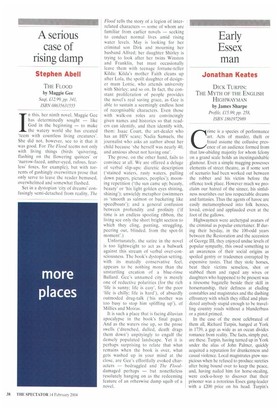A serious case of rising damp
Stephen Abell
THE FLOOD by Maggie Gee Saqi, £12.99, pp. 341, ISBN 08635631555 1 n this, her ninth novel, Maggie Gee has determinedly sought — like God in the beginning — to make the watery world she has created 'teem with countless living creatures'. She did not, however, see to it that it was good. For The Flood teems not only with living things (birds 'quivering, flashing on the flowering quinces' or 'narrow-faced, amber-eyed, rufous, fearless' foxes, for example), but with torrents of gushingly overwritten prose that only serve to leave the reader bemused, overwhelmed and somewhat flushed.
Set in a dystopian 'city of dreams' confusingly semi-detached from reality, The Flood tells the story of a legion of interrelated characters — some of whom are familiar from earlier novels — seeking to conduct normal lives amid rising water levels. May is looking for her criminal son Dirk and mourning her husband Alfred; her daughter Shirley is trying to look after her twins Winston and Franklin, but must occasionally leave them with teenage fortune-teller Kilda; Kilda's mother Faith cleans up after Lola, the spoilt daughter of designer mum Lottie, who attends university with Shirley; and so on. In fact, the constant proliferation of people provides the novel's real saving grace, as Gee is able to sustain a seemingly endless host of recognisable characters. Even those with walk-on roles are convincingly given names and histories so that readers can identify. and then identify with, them: Isaac Court, the art-dealer who has an HIV scare; Nadia Samuels, the journalist who asks an author about her child because 'she herself was nearly 40, and anxious about not having one'.
The prose, on the other hand, fails to convince at all. We are offered a deluge of verbal slip-ups: diuretic description ('stained waters, rusty waters, pulling down papers, pictures, peoples'); mooning repetition (the sun came up; beauty, beauty' or 'his light golden eyes shining, shining); unwieldy metaphor (swimmers as 'smooth as salmon or bucketing like speedboats'); and a general confusion between profundity and prolixity (if time is an endless spooling ribbon, the living see only the short bright section to which they cling, panting, struggling, peering out, blinded, from the spot-lit moment'.) Unfortunately, the satire in the novel is too lightweight to act as a bulwark against this stream of verbal over-consciousness. The book's dystopian setting, with its mutedly conservative feel, appears to be nothing more than the unstartling creation of a blue-rinse Ballard. Gee's unnamed city is merely one of reductive polarities (for the rich 'life is sunny; life is easy', for the poor 'life is chilly; life is hard'), of absurdly outmoded drug-talk Chas mother was too busy to stop him spliffing up'), of Millies and Moiras.
It is such a place that is facing diluvian apocalypse in the book's final pages. And as the waters rise up, so the prose swells ('drenched, dulled, death drags them down') unpityingly to engulf the densely populated landscape. Yet it is perhaps surprising to relate that what remains when the book is over, what gets washed up in your mind at the close, are Gee's effortfully evoked characters — bedraggled and The Flooddamaged perhaps — but nonetheless resolutely hanging on as the redeeming feature of an otherwise damp squib of a novel.


































































 Previous page
Previous page